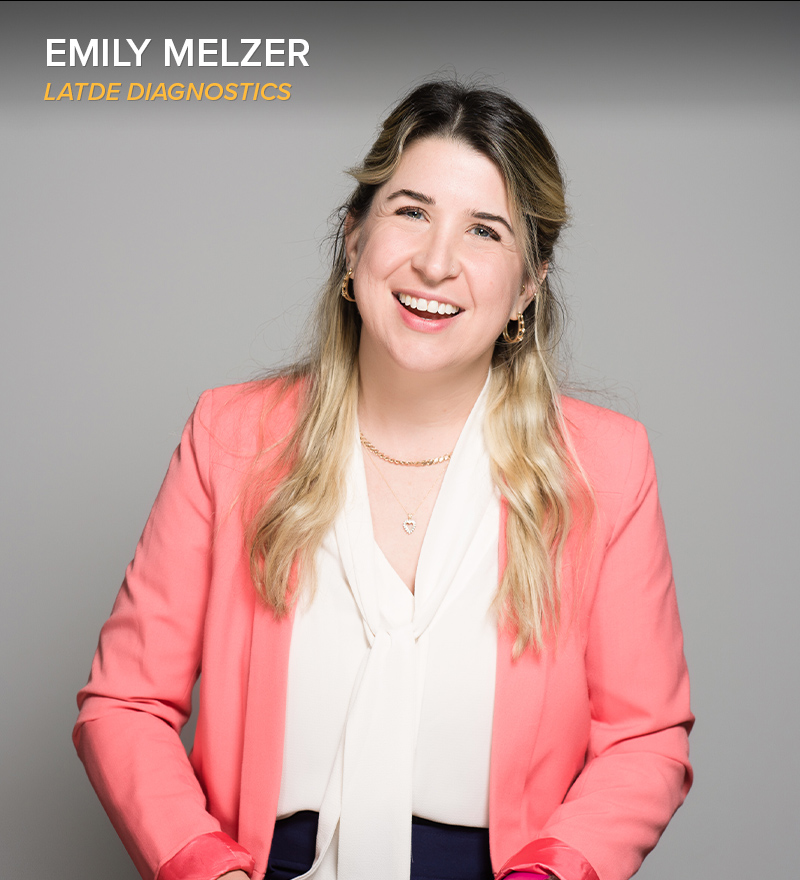
Innovator Stories
Latde Diagnostics CEO Emily Melzer immigrated from Israel to the United States to become a veterinarian.
Then she had to take one microbiology course as an undergrad. “I fell in love with it,” she said.
She earned her PhD in microbiology at the University of Massachusetts-Amherst, where Latde Diagnostics won the $50,000 first-place innovation grant in Lever’s 2023 Western Massachusetts Health Technology Challenge. Latde is developing a low-cost antibiotic susceptibility test that will be accessible to disadvantaged communities in the U.S. and around the world.

Innovator Stories
Meet Emily Melzer
Latde Diagnostics CEO Emily Melzer immigrated from Israel to the United States to become a veterinarian.
Then she had to take one microbiology course as an undergrad. “I fell in love with it,” she said.
She earned her PhD in microbiology at the University of Massachusetts-Amherst, where Latde Diagnostics won the $50,000 first-place innovation grant in Lever’s 2023 Western Massachusetts Health Technology Challenge. Latde is developing a low-cost antibiotic susceptibility test that will be accessible to disadvantaged communities in the U.S. and around the world.
Emily recently returned from an infectious disease conference in Copenhagen, Denmark. “About half of the exhibitors were showcasing antibiotic susceptibility tests. It felt like it was a competition for who can make the biggest, fanciest, shiniest, most expensive antibiotics susceptibility testing machine,” she said.
She spoke with physicians from countries such as Colombia, Nigeria, France, and Finland.
“I’m asking them ‘Would you buy any of these?’ They’re saying ‘No, we can’t afford them, of course not.’”
Latde was launched two and a half years ago, in the height of the pandemic, which Emily credits with helping to inform developments on the shape of Latde’s test going on the market. “For our final product, the test format we want to use is basically the same format as what we use for at-home COVID-19 tests,” she said.
“One of our objectives is to help mitigate the global antibiotic resistance crisis, and unfortunately this crisis has been accelerated by the pandemic. Because a lot of COVID patients [often developed with symptoms of] bacterial infections when they were in the hospital, they were prescribed inappropriate antibiotics.”
As for the road ahead, the Ladte test could not only expand to detecting bacteria in food and water, but also for sterility testing in biomanufacturing.
“I really do believe we are onto something,” Emily said. I think this technology has the potential to solve a lot of different problems. The antibiotic susceptibility test is just the first application. Which is why I feel like this customer discovery journey is never going to end.”
Emily and Sloan Siegrist, co-founder and chief scientific officer, operate Latde from UMass Amherst, renting a laboratory on the campus and hiring their own team.
“There are a lot of people at UMass Amherst that believed in us in the beginning, and have supported us through funding, but also through mentoring and everything that has to do with filing and IP”.
With the feedback received so far and the newfound funding, Latde can step towards building a prototype test.
Emily recently returned from an infectious disease conference in Copenhagen, Denmark. “About half of the exhibitors were showcasing antibiotic susceptibility tests. It felt like it was a competition for who can make the biggest, fanciest, shiniest, most expensive antibiotics susceptibility testing machine,” she said.
She spoke with physicians from countries such as Colombia, Nigeria, France, and Finland.
“I’m asking them ‘Would you buy any of these?’ They’re saying ‘No, we can’t afford them, of course not.’”
Latde was launched two and a half years ago, in the height of the pandemic, which Emily credits with helping to inform developments on the shape of Latde’s test going on the market. “For our final product, the test format we want to use is basically the same format as what we use for at-home COVID-19 tests,” she said.
“One of our objectives is to help mitigate the global antibiotic resistance crisis, and unfortunately this crisis has been accelerated by the pandemic. Because a lot of COVID patients [often developed with symptoms of] bacterial infections when they were in the hospital, they were prescribed inappropriate antibiotics.”
As for the road ahead, the Ladte test could not only expand to detecting bacteria in food and water, but also for sterility testing in biomanufacturing.
“I really do believe we are onto something,” Emily said. I think this technology has the potential to solve a lot of different problems. The antibiotic susceptibility test is just the first application. Which is why I feel like this customer discovery journey is never going to end.”
Emily and Sloan Siegrist, co-founder and chief scientific officer, operate Latde from UMass Amherst, renting a laboratory on the campus and hiring their own team.
“There are a lot of people at UMass Amherst that believed in us in the beginning, and have supported us through funding, but also through mentoring and everything that has to do with filing and IP”.
With the feedback received so far and the newfound funding, Latde can step towards building a prototype test.
